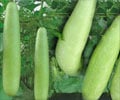Compounds extracted from green vegetables such as broccoli and cabbage could be a potent drug against melanoma, according to cancer researchers.
Compounds extracted from green vegetables such as broccoli and cabbage could be a potent drug against melanoma, according to cancer researchers. Tests on mice suggest that these compounds, when combined with selenium, target tumors more safely and effectively than conventional therapy.
"There are currently no drugs to target the proteins that trigger melanoma," said Gavin Robertson, associate professor of pharmacology, pathology and dermatology, Penn State College of Medicine. "We have developed drugs from naturally occurring compounds that can inhibit the growth of tumors in mice by 50 to 60 percent with a very low dose."Robertson and his colleagues previously showed the therapeutic potential of targeting the Akt3 protein in inhibiting the development of melanoma. The search for a drug to block the protein led them to a class of compounds called isothiocyanates.
These naturally occurring chemicals found in cruciferous vegetables are known to have certain cancer-fighting properties. However, the potency of these compounds is so low that a successful drug would require large impractical amounts of these compounds.
Instead, the Penn State researchers rewired the compounds by replacing their sulfur bonds with selenium. The result, they believe, is a more potent drug that can be delivered intravenously in low doses.
"Selenium deficiency is common in cancer patients, including those diagnosed with metastatic melanoma," explained Robertson, whose findings appear in the March edition of Clinical Cancer Research. "Besides, selenium is known to destabilize Akt proteins in prostate cancer cells."
To study the effectiveness of the new drug -- isoselenocyanate -- researchers injected mice with 10 million cancer cells. Six days later, when the animals developed large tumors, they were divided into two groups and treated separately with either the vegetable compounds or the compounds supplemented with selenium.
Advertisement
When the researchers exposed three different human melanoma cell lines to the two compounds, the selenium-enhanced drug worked better on some cell lines than others. The efficiency was from 30 to 70 percent depending on the cell line.
Advertisement
"We have harnessed something found in nature to target melanoma," said Robertson. "And since we only need tiny amounts to kill the cancer cells, it means even less toxic side-effects for the patient."
Human trials of the new drug are still some years away, but the Penn State researcher envisions a drug that could be delivered either intravenously to treat melanoma, or added to sunscreen lotion to prevent the disease.
Source-Eurekalert
SRM















